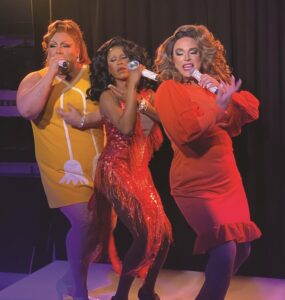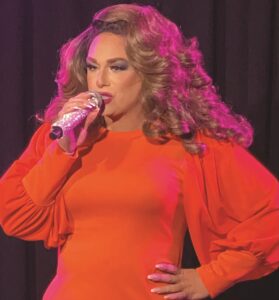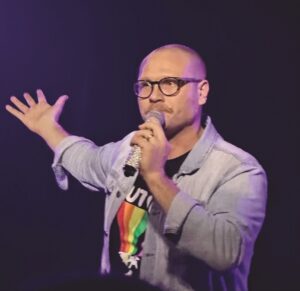PROVINCETOWN — Local performers are pushing back against a raft of anti-drag bills across the country that characterize their work as pornographic — or worse. According to a Feb. 12 report in The Economist, there are now at least 36 bills in 15 states aimed at restricting drag performances under the guise of protecting children.

“We’re going to stand our ground,” said Devin Marchany, known as Roxy Pops, one of Provincetown’s resident drag artists. “We’re going to organize. We’re going to raise money. We’re going to ask our audiences to vote in our favor. We’re going to fight.”
Pops was among the performers participating in “Public Drag Show,” a fundraiser held at the Crown & Anchor on March 25 to benefit a national opposition movement being led by RuPaul Charles, host of the global RuPaul Drag Race television programs, and the American Civil Liberties Union. The show raised $7,000, with 50 percent going to the ACLU drag defense fund and 50 percent split among the performers, according to Jonathan Hawkins, an owner of the Crown and its impresario.
The bills characterize drag shows as adult cabaret performances, a category generally reserved for strippers performing nude or semi-nude. The new laws would prohibit drag performances in public places where minors could watch, often with regulations on how close they can be to public schools or places where children are present.
“What’s sad is that there are just so many other really important issues about protecting children,” said Russ King, a.k.a. Miss Richfield 1981. Richfield is known for producing family-friendly shows and encouraging parents to bring their children. “Why not focus on children in poverty or the rising numbers of women dying in childbirth?” she asked.

These bills are part of an unprecedented number of anti-LGBTQ laws being tracked by the ACLU, according to its website. One week ago, the site had posted 429 such bills. As of the Independent’s deadline this week that number had risen to 431.
Tennessee is the first state to have a bill banning public drag performances visible to children signed into law. Fines for violators can be up to $2,500, and the law allows for prison sentences of up to one year. Further violations are punishable by up to six years in jail. The Daily Beast reported on Feb. 27 that Tennessee’s law “specifically protects children from obscene, sexualized entertainment”; Gov. Bill Lee’s appearance in drag in a photo in his high school yearbook had just surfaced. The bill associates any form of dressing outside one’s gender as “adult” entertainment.
A similar bill in Arizona, which has become a national testing ground for a wide range of new laws that limit civil liberties, would also characterize drag shows as “adult-oriented performances.” There, artists who perform in front of children under 15 years old would be subject to at least 10 years in prison and forced to register as sex offenders, according to the Arizona Mirror. People who allow minors to view drag shows or even enter a location where one is happening could also be punished.
Arizona’s bill would add drag shows to a state law about “dangerous crimes against children,” according to the Phoenix New Times. The bill defines drag shows as adult-oriented performances and compares them to bestiality, child sex trafficking, second-degree murder, and sexual assault.
Opposition to the measures has emerged within only one political party so far. Arizona’s Democratic Gov. Katie Hobbs is expected to veto the bill should it make its way through the state senate to her desk, but similar bills in states not controlled by Democrats are advancing and are likely to be signed into law, according to the ACLU.
Matty Laurenza, a local drag artist who performs under the name Liza Lott, told the Independent she was worried about her fellow performers in Tennessee. Lott said she is ready to join their protests.

“I’m ready and willing to fight this battle,” she said. “I will march with them, and if we get arrested, then we get arrested.”
“There’s a faction out there that just cannot stand that these groups are not going back in the closet,” said Pops, citing the recent furor over children and trans people using gender-specific bathrooms, medical care for trans minors, and the increased visibility of trans people everywhere. “This is just another smoke screen for their own hang-ups,” she said.
Pops plans to use her platform to encourage audiences to vote in favor of freedom of expression.
“We can’t let up on urging people to vote,” said Pops. “A lot of straight people come to our shows and enjoy them but then may be silent at the ballot box. We ask our audiences to remember the great time they had when they came to visit when they go to vote.”
“I’ve lived through a lot of struggles,” said Richfield. “I lived through the AIDS crisis. I was here for the marriage equality fight. I’ve seen how our community comes through a struggle stronger than before. I believe we will come out of this ahead.
“There will be pain,” she added. “There’s likely to be a lot of loss of income for performers and venues and all the other people who directly and tangentially make money from live performances. It will have to work its way through the courts, and Americans are going to have to decide if this is really a free country or not.”
